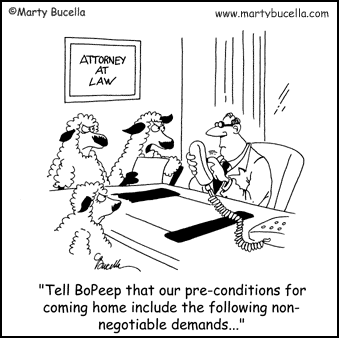 Which of the following people have/had the right personality for successful negotiations?
Which of the following people have/had the right personality for successful negotiations?
- Henry Kissinger
- Gandhi
- Franklin Delano Roosevelt
- Al Pacino, as Michael Corleone, in The Godfather
The answer: It depends. Who will they be negotiating with? What’s at stake? And is it essential for you to maintain a good relationship with the other party?
Negotiating styles, like personalities, are unique. However, data we collected from our Negotiation Aptitude Profile reveals that there are certain skills and personality traits that great deal-makers possess. Collecting data from 485 people for whom negotiating is a major part of their job, we compared the traits and skills of good vs. poor negotiators. Here’s what we discovered:
Integrity
Toss out the notion that you need to be underhanded in order to be a good negotiator. Top negotiators in our study possess a great deal of integrity, and are less likely to use “dirty” negotiation tactics, like intimidation, intentionally stalling before signing, or adding last-minute demands to a contract. Good negotiators scored 82 on the Integrity scale, while poor negotiators got an average score of 47 – a whopping 35-point difference.
Social Skills
Top negotiators have good people skills. They are good at picking up on social cues, adept at reading body language, and have a good understanding of human nature – they know what makes you tick, what will make you happy, and what motivates your decisions. The average social skills score of good negotiators was 81 vs. 62 for poor negotiators – a difference of 19 points.
Problem-solving Skills
They are creative problem-solvers. They don’t just look for the easiest solution to a dilemma; they take the time to come up with an innovative approach. And when all else fails, top negotiators are not afraid to go with their gut. Good negotiators scored 81 on problem-solving skills, compared to the average score of 49 for poor negotiators – a 32 point difference.
Preparation and Planning
Although the concept of “know your enemy” may sound a bit extreme, top negotiators never go into a negotiation without doing their homework. They’ll learn as much as they can about the person they are negotiating with and will make sure to establish exactly what they want from the negotiation - and when to walk away. Top negotiators will also collect information that can come in handy when making a deal, like market values, and will go through a contract with a fine tooth comb before signing. Good negotiators, averaging 71 on this scale, outscored their poor counterparts (with an average score of 38) by 33 points.

Stress Management
Good negotiators are exceptionally good at managing stress and their emotions, which comes in handy in high-stake negotiations or during difficult deadlocks. A stressed-out negotiator is like a helpless seal in an ocean of Great White sharks – vulnerable to attack and desperate to come out alive, no matter the cost. Even if they do feel a sense of pressure to get a deal done, top negotiators certainly won’t let it show. Good negotiators scored 81, while the average score for poor negotiators was only 50 for – a difference of 31 points.
Assertiveness
There’s a fine line between assertiveness and aggressiveness, and top negotiators know how to walk that line with finesse. They are not intimidated by domineering personalities, and will calmly and confidently state their needs and wants. Their words, tone of voice, and posture are firm and self-assured. The average assertiveness score was 72 for good negotiators vs. 46 for poor negotiators – a difference of 26 points.
Open-mindedness
Going into a negotiation with the assumption that the other party will take advantage of you, gouge you for everything you’ve got or engage in unscrupulous practices may set you up for a very difficult and unpleasant negotiation. Top negotiators are willing to withhold their judgment and are able to go into a negotiation with an open mind. They won’t assume that everyone is a “dirty” negotiator, and are willing to consider alternative approaches. Good negotiators averaged 75 on the open-mindedness scale, compared to an average of 50 for poor negotiators – a difference of 25 points.
Listening Skills
It’s one of the most underrated interpersonal skills – and absolutely essential to successful negotiations. Top negotiators know that in order to better understand the other party’s position (and to adjust their own approach accordingly) they need to pay attention, not just to a person’s words, but to their body language as well. The average listening score of good negotiators was 70 for vs. 48 for poor negotiators – a difference of 22 points.
If you’re interested in using NAP (Negotiation Aptitude Profile) or other tests for HR purposes, request a free trial for ARCH Profile here.
Want to learn more about using psychological tests for hiring, leadership development, career development or talent retention? Download our free eBook loaded with down-to-earth information about psychological testing for HR purposes.

